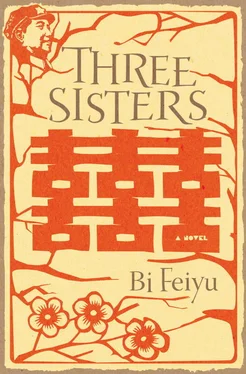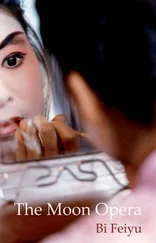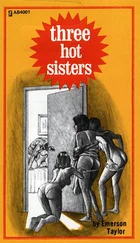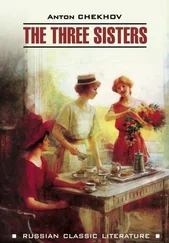Finally, on the fourth day, she opened her mouth; her lips were flaked with dead skin. Holding a bowl of sticky rice porridge in her hand, Yumi fed her sister one slow spoonful at a time, and as Yuxiu looked up at Yumi, she abruptly wrapped her arms around her sister’s waist. Weak though she was, she held on with all her might, her hands like those of a corpse. Instead of trying to pry them apart, Yumi ran her fingers through Yuxiu’s hair, then combed and braided it. Finally, she told Yuyang to fetch a basin of water to wash Yuxiu’s face.
When that was done, she took her sister’s hand and said, “Get up and come with me.” She said it softly but with authority.
Blurry-eyed, Yuxiu looked up at her sister and shook her head.
“Are you just going to hole up here? How long do you expect to do that? Our family has never been afraid of anyone, don’t you know that?” Yumi said.
She opened a drawer, took out a pair of scissors, and handed them to Yuxiu. “Cut off your braids and then come with me,” she said.
Yuxiu shook her head again, but the meaning behind it was different this time. Then she was afraid to go outside; now it was the refusal to part with her braids.
“What do you want to keep them for? It was your seductive manner that got you into this trouble in the first place,” Yumi said, as she snatched the scissors out of her sister’s hand and— snip —one of Yuxiu’s braids fell to the floor— snip —then the other braid joined it. She picked the braids up off the floor and tossed them into the commode, then tucked the scissors into her waistband, took Yuxiu by the hand, and started out the door.
“Come with me,” she said. “I’ll cut the tongue out of anyone who says a word.”
So Yumi strolled through the village with Yuxiu, who shuffled along, her limp body seemingly weightless and quite ugly. Her hair, now minus the braids, looked like a nest of straw and chicken feathers. Yumi, armed with the scissors, was her protector. One look was all it took anyone to figure out her intentions, and they dared not meet that glare; they either turned away or walked off.
She kept telling her sister, who trailed behind her, to hold her head up. Yuxiu did as she was told. Though she was drawing strength from her sister’s fierce demeanor—the fox parading along behind the tiger—at least she was out in public.
Unspoken feelings of gratitude toward Yumi rose up inside her, tempered by an inexpressible sense of loathing. It was an unfounded loathing, utterly unreasonable, and yet there it was, deep in the marrow of her bones. They had fought for years, but in the end, she had no choice but to rely on Yumi’s authority and her sympathy.
Why had Yumi been born a girl? she wondered. How wonderful it would have been if she were a boy, my older brother.
But she wasn’t; Yumi was her older sister, and now she was getting married and moving away. The wedding boat was tied up at the pier, and Yuxiu had not gone to see her off. Yuxiu was afraid to. She might hate her sister, but she wished that Yumi didn’t have to leave Wang Family Village. Yuxiu the fox was lost without Yumi the tiger. No longer would she find the courage to mix with people, to be in a crowd. She slipped over to the concrete bridge to the east, where she leaned against the railing and waited, looking far off in the distance. Her lovely eyes, now filled with melancholy and anxiety, were trained on the jubilant scene at the distant pier; none of that joy reached far down the river to Yuxiu. Sunlight danced crazily on the surface of the river, fragmented and blinding. The boat was coming her way, and as it neared the bridge, Yumi spotted Yuxiu. The sisters, one in a boat, the other on a bridge, exchanged gazes as the distance closed and they could see each other more clearly. The boat sped under the bridge, and both girls spun around to keep looking at each other, although now the distance increased and their figures grew more indistinct. Then Yuxiu saw Yumi stand up in the boat and shout something. The wind carried it up to her. She heard every word: Don’t forget to carry a knife when you go out.
The roar of the motor faded as the boat turned at a bend in the river and disappeared from view. The waves it had created had smoothed out, and now only a bright scar was left on the surface. Yuxiu was still on the bridge, still looking down the river, seemingly focused but actually in a daze. The sun had migrated to the western sky, casting a red patina over the river and elongating Yuxiu’s shadow on its surface, at once docile and quivering. She looked down at that shadow, staring at it so long that it turned into an optical illusion, looking as if it were being carried along by the ripples on the water. But by regaining her focus, she saw that it had stayed put and was not going anywhere. If only my shadow could transform itself into a speedboat , she was thinking, I could leave Wang Family Village and go anywhere I wanted.
Yuxiu was surprised to see a dozen or more little girls standing in a circle in front of her door when she turned into the lane. She walked up to see what they were doing and spotted her second sister, Yusui, in the middle, showing offa spring-and-autumn blouse Yumi had left behind, the one Liu Fenxiang had worn as the propaganda troupe’s program announcer; it had a decidedly urban look—a turned-down collar and a narrow waist. Yumi would never have considered wearing any of that woman’s clothes, but she hadn’t the heart to throw anything that pretty away.
Yuxiu was a different matter altogether. She had kept her eye on the blouse for some time. There is a popular saying that goes “Men never turn down a drink, and women never say no to clothes.” Who cares whom it belonged to? A pretty blouse is a pretty blouse was how Yuxiu looked at it. But she hadn’t worn it yet, out of a fear of Yumi. Imagine her surprise when Yusui claimed it the minute Yumi was out the door. Something that nice on Yusui was like a hungry dog with a turd in its mouth—it cannot be pried out.
Yuxiu stopped at the lane entrance to observe Yusui with a squint. How could something that nice lose its charm as soon as Yusui put it on? The look on Yuxiu’s face was not pretty. Obviously, now that Yumi was gone, Yusui was setting herself up as the new head of household. An ordinary girl like her ought at least to take a good look at herself. The longer Yuxiu stood there, the dumber her sister appeared, especially now that she’d ruined a perfectly good blouse. Yuxiu elbowed her way up next to Yusui and demanded, “Take it off”
“Says who?” Yusui replied, still caught up in the excitement.
“I said take it off,” Yuxiu said in a tone that left no room for bargaining.
Apparently softening a bit, but not ready to give in, Yusui repeated, “Says who?”
Used to having her way, Yuxiu got in her sister’s face and said icily, “Are you going to take it off or aren’t you?”
Yusui knew that she was no match for Yuxiu, but one glance at the other girls told her that she’d lose face if she gave in meekly. In the end, she took off the blouse, held it for a moment by the collar, then dropped it on the ground and stomped all over it.
“Take it,” she screamed. “You act so high and mighty, even after all those men have had you. You piss pot! You shit can!”
Before eight o’clock in the morning, the main street of Broken Bridge is, in essence, an open-air market that sends a jumble of smells from one end to the other. But after eight, the street undergoes a transformation, becoming clean and orderly. This comes about not by fiat but by the demands of daily life, which are strictly followed and unchanging. The middle-school PA system crackles to life, heralding a solemn moment: “Beijing time—8:00 A.M.” Beijing time: distant, intimate, sacred, a symbol of unity, a sign that all China’s citizens live planned, disciplined lives—not only the residents of Beijing, but everyone in the country. The beloved Chairman Mao is already attending to state affairs at Tiananmen, [3] This is how country folk might comment that the government is up and running.
and it is time for womenfolk in towns everywhere to stop haggling over prices. The morning sun’s slanting rays light up the street and are reflected off of the cobblestones, turning them red. Small pockets of quiet, bordering on total stillness, settle over the street, belying the preparations already under way. And then the general store opens its door, and the purchasing co-op opens its door. The post office, the credit union, the commune offices, the hospital, the farm-tools factory, the blacksmith and carpentry shops, the provisions branch, the grain-purchasing station, the transport office, the culture station, and the livestock-purchasing station—every unit subsumed under the nation slowly opens its big iron door for business. No longer an open-air market, the street has become an integral part of the “nation,” involved in the functions and powers of “state.” As these doors open one by one, a ceremonial aura quietly infuses the street, even though, not surprisingly, the townsfolk are unaware of it; it is an aura of willful indolence with a hint of solemnity. It is the moment when the new day officially begins.
Читать дальше











